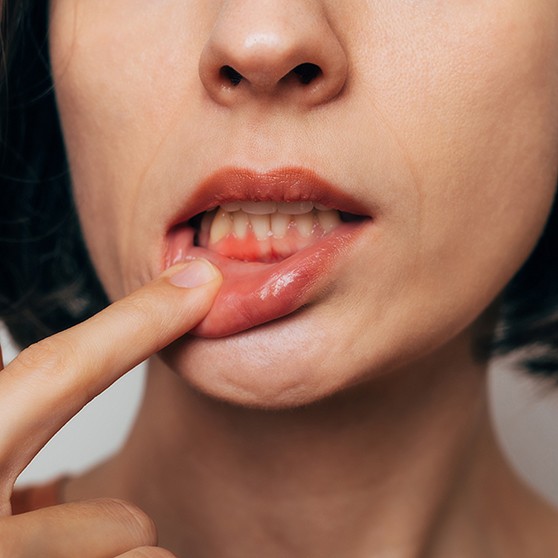Gum Disease Treatment – Cranford
Restoring Gum Health & Improving Smiles
Periodontal disease, more commonly known as gum disease, is a growing problem among adults in the United States. With millions of individuals suffering from tender, bleeding, and inflamed soft oral tissues, many do not realize they have a problem until it’s time to see their dentist. While early stages of gingivitis can be reversed, more advanced symptoms can result in bone and tooth loss as well as problems developing throughout the body. Fortunately, our board-certified periodontal specialists are here to deliver high-end care with a gentle and thorough approach. Call us if you're concerned that you might need gum disease treatment in Cranford.
Why Choose Cranford Center for Periodontics & Gum Disease Treatment?
- Serving the Cranford Community for More Than 20 Years
- Team of Board-Certified Periodontal Specialists
- Sedation Dentistry Available
What Is Gum Disease?

Gum disease is an infection of the gums and supportive tissues in the mouth. A lot of the time, it is a result of plaque and tartar buildup due to poor oral hygiene. This can result in permanent gum damage, tooth loss, and other serious health problems. There are two stages of gum disease. Here’s what they consist of.
- Gingivitis: This is the earliest stage of gum disease. It can usually be reversed by improving your dental hygiene routine at home and seeing your dentist for professional cleanings and exams.
- Periodontitis: This is the more advanced stage of gum disease. At this point, it can’t be cured – only managed. However, management is necessary to prevent further infection and serious complications, including tooth loss.
Many factors affect your risk of developing gum disease. The most common ones include smoking, chewing tobacco, poor oral hygiene, genetic factors, immune-compromising conditions, medication, and hormonal changes, like pregnancy.
Symptoms of Gum Disease

Gum disease is very common, so it’s important to be on the lookout for symptoms. Here are some of the most notable ones.
Gingivitis:
- Halitosis (bad breath)
- Bleeding when brushing and flossing
- Red, inflamed gum disease
- Gum tenderness
- Recession of the gums
Periodontitis:
- Pain when chewing
- Loose teeth
- Sensitive teeth
- Bite changes
- Tooth loss
How Do We Treat Gum Disease?
Depending on the severity of your gum disease, we may recommend one or both of the following treatment options.
Antibiotic Treatment

Oftentimes, scaling and root planing are not enough to completely eradicate signs of bacteria. This is where we incorporate antibiotic therapy in the form of Arestin and chemotherapeutic agents. These solutions are applied to the gum pockets, where the medicine is dispersed over time to target and eliminate any remaining bacteria. This non-surgical method of treatment is essential for long-term success.
Scaling & Root Planing

When gum pockets form and easily trap bacteria, we can implement what is known as scaling and root planing. This two-part process involves removing calculus from the teeth (scaling) before attacking the tartar that exists below the gumline, effectively smoothing the tooth root (root planing). This allows for better reattachment of the gums and teeth and minimizes the potential risk for bacteria to re-adhere to the surface.
Do I Need Scaling & Root Planing?

In some cases, the early stage of gum disease can be reversed by thorough at-home oral hygiene. However, if the condition has progressed somewhat, scaling and root planing may be necessary. Here are some signs that a visit to a periodontist may be in order:
- Your gums bleed easily when you brush and floss.
- Your gums are receding.
- You struggle with persistent bad breath.
- Your gums are often swollen and puffy.
- Your gums are discolored (they may appear red rather than pink).
The Process of Scaling & Root Planing

Scaling and root planing may take a few appointments, depending on the extent of the necessary treatment. The process involves two main stages:
- During scaling, we scrape away plaque and tartar (also called calculus) from the surface of the teeth. We clean both above and below the gumline in order to remove these harmful biofilms.
- During root planing, we smooth out the roots of the teeth so it is more difficult for bacteria to cling to them.
After treatment, the hope is that your gums will reattach to your teeth and your mouth will be able to recover from gum disease.
Aftercare Tips for Scaling & Root Planing

Scaling and root planing is an intensive treatment, so it may be a few weeks before your teeth and gums begin to feel normal again. In the meantime, you may notice increased sensitivity and discomfort. Rinsing your mouth with warm salt water, consuming a soft and non-spicy diet, and being gentle during oral hygiene tasks can all minimize posttreatment difficulty.
If you encounter any questions or concerns during your recovery, please give us a call; we are always ready to help!

